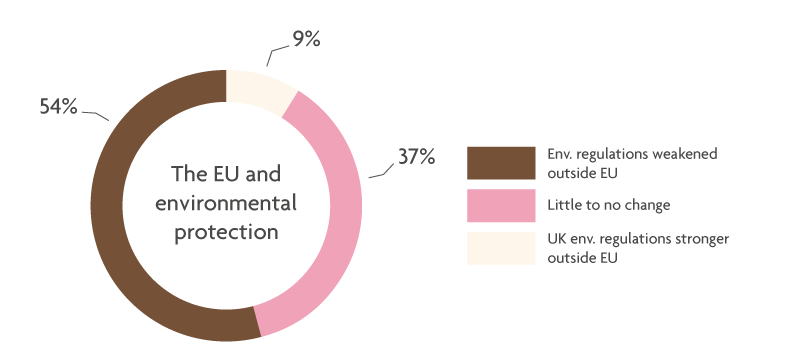On 23rd June 2016 the UK voted to leave the European Union. The exact terms of this departure are still being decided, so we asked our website visitors what they expected the outcome to be for environmental protection.
In response to the question of: “What impact do you think the UK's decision to leave the EU will have on environmental protection?”, the results were clear.

A majority of website visitors (54%) voted that “without binding EU law, it is likely environmental regulations will be weakened or scrapped in the UK”.
A significant proportion (37%) of respondents voted that “little will change – existing protections will be maintained, and new EU protections reflected in domestic legislation”.
Finally, a small proportion (9%) voted that “the UK will develop a new framework for environmental protection, stronger than that offered by the EU.”
With each of these options selected, the exact nature of how the scenario would play out should be explored. Take for example, the most popular answer, “regulations will be weakened or scrapped”. The only scenario where legislation could be weakened or scrapped across the board would be if the UK chose not to remain a member of the European Economic Area (EEA) and therefore the single market. If the UK chose to remain as part of this trading bloc then the vast majority of EU regulations would still apply. Membership of the EEA or single market is likely to lead to the 'little changing' option.
If the UK chose to remain part of the EEA some legislation would cease to apply and might be completely redrafted. For example, the Birds and Habitats Directives, the Bathing Water Directive, the Common Agricultural and Fisheries Policies (CAP and CFP), with much criticism levelled at the CAP in particular. The enforcement structure of the EU and European Court of Justice offers accountability that would not be present once the UK leaves.
The final option, that the UK will develop stronger protection outside of the EU, could be possible under either situation: remaining in the EEA; or a complete departure. Doubts have been raised of the likelihood of the UK government developing stronger legislation and regulation than would have been otherwise present under the governance of the European Union.
In a piece of analysis conducted in the run-up to the referendum, the Institute for European Environmental Policy (IEEP) stated that:
“Judging by UK government responses to a range of environmental proposals from the European Commission in recent years, it seems more likely that the current government, and possibly its successors, would opt for a less ambitious approach than that adopted by the EU in a number of areas, including air pollution, recycling, and aspects of nature conservation.”
For more on this topic from the IES, have a look at:
- Analysis from Robert Ashcroft, the IES' Policy Officer, about the imperative of maintaining environmental protection.
- IES response to a Select Committee inquiry on the implications of Brexit for science and research.
- Poll results from a poll conducted before the referendum, assessing members' desired outcome.



